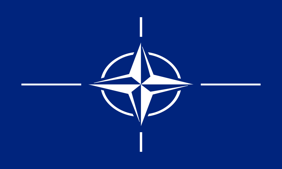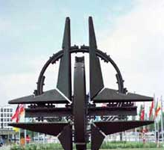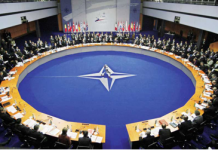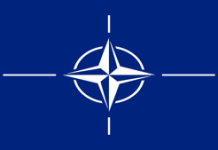- Belgium
- Canada
- Denmark
- France
- Iceland
- Italy
- Luxembourg
- Netherlands
- Norway
- Portugal
- United Kingdom
- United States
Later the following nations joined:
- Greece (1952)
- Turkey (1952)
- West Germany (1955)
- Spain (1982)
- Czech Republic (1999)
- Hungary (1999)
- Poland (1999)
- Bulgaria (2004)
- Estonia (2004)
- Latvia (2004)
- Lithuania (2004)
- Romania (2004)
- Slovakia (2004)
- Slovenia (2004)
- Albania (2009)
- Croatia (2009)
The heart of NATO is expressed in Article 5 of the North Atlantic Treaty, in which the signatory members agree that an armed attack against one or more of them in Europe or North America shall be considered an attack against them all; and consequently they agree that, if such an armed attack occurs, each of them, in exercise of the right of individual or collective self-defense recognized by Article 51 of the Charter of the United Nations, will assist the Party or Parties so attacked by taking forthwith, individually and in concert with the other Parties, such action as it deems necessary, including the use of armed force, to restore and maintain the security of the North Atlantic area.
NATO’s essential and enduring purpose, set out in the Washington Treaty, is to safeguard the freedom and security of all its members by political and military means. Based on common values of democracy, human rights and the rule of law, the Alliance has striven since its inception to secure a just and lasting peaceful order in Europe. It will continue to do so. The achievement of this aim can be put at risk by crisis and conflict affecting the security of the Euro-Atlantic area. The Alliance therefore not only ensures the defence of its members but contributes to peace and stability in this region.
he fundamental guiding principle by which the Alliance works is that of common commitment and mutual co-operation among sovereign states in support of the indivisibility of security for all of its members. Solidarity and cohesion within the Alliance, through daily cooperation in both the political and military spheres, ensure that no single Ally is forced to rely upon its own national efforts alone in dealing with basic security challenges. Without depriving member states of their right and duty to assume their sovereign responsibilities in the field of defence, the Alliance enables them through collective effort to realise their essential national security objectives.
The resulting sense of equal security among the members of the Alliance, regardless of differences in their circumstances or in their national military capabilities, contributes to stability in the Euro-Atlantic area. The Alliance does not seek these benefits for its members alone, but is committed to the creation of conditions conducive to increased partnership, cooperation, and dialogue with others who share its broad political objectives.
To achieve its essential purpose, as an Alliance of nations committed to the Washington Treaty and the United Nations Charter, the Alliance performs the following fundamental security tasks:
Security: To provide one of the indispensable foundations for a stable Euro-Atlantic security environment, based on the growth of democratic institutions and commitment to the peaceful resolution of disputes, in which no country would be able to intimidate or coerce any other through the threat or use of force.
Consultation: To serve, as provided for in Article 4 of the Washington Treaty, as an essential transatlantic forum for Allied consultations on any issues that affect their vital interests, including possible developments posing risks for members’ security, and for appropriate co-ordination of their efforts in fields of common concern.
Deterrence and Defence: To deter and defend against any threat of aggression against any NATO member state as provided for in Articles 5 and 6 of the Washington Treaty.
Through its active pursuit of partnership, cooperation, and dialogue, the Alliance is a positive force in promoting security and stability throughout the Euro-Atlantic area. Through outreach and openness, the Alliance seeks to preserve peace, support and promote democracy, contribute to prosperity and progress, and foster genuine partnership with and among all democratic Euro-Atlantic countries. This aims at enhancing the security of all, excludes nobody, and helps to overcome divisions and disagreements that could lead to instability and conflict.







